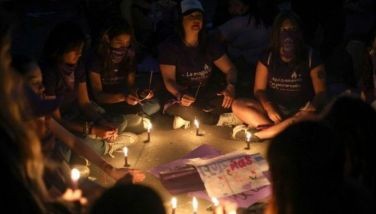Pro-Russian rebels reject peace deal, launch offensive
DONETSK, Ukraine — Pro-Russian rebels in eastern Ukraine rejected a previously signed peace deal Friday and announced a new multi-pronged offensive against Ukrainian government troops.
The main separatist leader in the Donetsk region said the insurgents won't join further peace talks and another rebel went even further saying they will not abide by a peace deal signed in September.
Separatist leader Alexander Zakharchenko said rebel fighters launched the new offensive to gain more territory and forestall a Ukrainian attack. He declared they will push the government troops to the border of the separatist Donetsk region and possibly even further.
"Attempts to talk about a cease-fire will no longer be undertaken by our side," Zakharchenko said.
The peace deal signed in September in the Belarusian capital of Minsk envisaged a cease-fire and a pullout of heavy weapons from a division line in eastern Ukraine. It has been repeatedly violated by both sides, and there has been a surge in fighting and deadly mortar attacks in the last few weeks.
The foreign ministers from Russia, Ukraine, France and Germany agreed Wednesday to revive that division line, but fighting has continued unabated. The U.N. human rights agency on Friday raised its estimate of the conflict's overall death toll to nearly 5,100 since April due to the fighting.
A top NATO official agreed the rebels have pushed further west and have been beefed up with reinforcements. U.S. Air Force Gen. Philip Breedlove said air defense and electronic warfare equipment have been detected in eastern Ukraine — hardware that, in the past, coincided with the incursion of Russian troops into Ukraine.
Russia insists that it does not support the rebels, but Western military officials say the sheer number of heavy weapons under rebel control belies that claim.
A pro-Russian insurgency flared up in April in the Donetsk and Luhansk regions in eastern Ukraine following Russia's annexation of Ukraine's Crimean Peninsula. Donetsk, the largest rebel-held city, was hit this week with mortar attacks and fighting over its war-wrecked airport that killed at least 30 people.
The tentative peace deal forged this week in Berlin concluded with an agreement to uphold a demarcation line defined in September. The plan called for Ukrainian troops and Russian-backed separatists to pull back their heavy arms 15 kilometers (9 miles) on either side of the line, although there was no agreement on a withdrawal of troops.
Battles intensified last weekend over Donetsk airport, a gleaming showcase for the Euro 2012 soccer championship that has been reduced to piles of rubble and steel beams by months of clashes. Rebels eventually took control of its terminal, although fighting is still going on nearby.
At the international economic forum in Davos, Switzerland, a Russian deputy prime minister vowed that Moscow would not be cowed by the sanctions the West has imposed upon Russia for its actions in Ukraine.
Igor Shuvalov warned the West against trying to topple Russian President Vladimir Putin, reflecting the Kremlin's view that the European Union and U.S. sanctions are aimed at regime change.
"When a Russian feels any foreign pressure, he will never give up his leader," Shuvalov said Friday. "We will survive any hardship in the country — east less food, use less electricity."
The Russian currency has lost half its value in recent months from the double blow of sanctions and a plunge in world oil prices.
Ukrainian President Petro Poroshenko said stern retribution would await anybody violating the peace. After a speech Wednesday at Davos, he rushed home to deal with the escalating fighting.
"If the enemy doesn't want to abide by the cease-fire, if he doesn't want to put an end to the suffering of peaceful people, Ukrainian villages and town, we will smash them in the teeth," Poroshenko told top defense officials
- Latest
- Trending

































